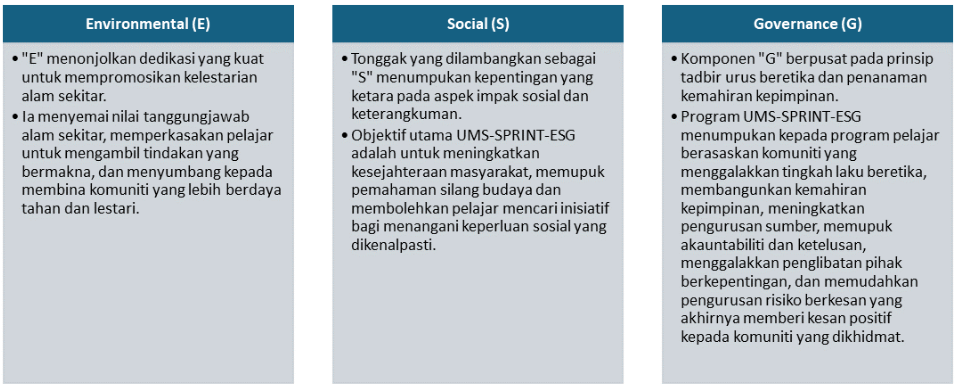Training Programs
Key Environmental Sustainability Training Programs at UMS
Universiti Malaysia Sabah (UMS) has been actively conducting environmental sustainability training programs aligned with the United Nations Sustainable Development Goals (SDGs). These initiatives demonstrate UMS’s strong commitment to building a sustainable campus and promoting environmental awareness among its faculty and professional staff. Many of these programs are recognized as part of the staff’s mandatory annual training under the Individual Development Plan (IDP) framework.
1) UMS Sustainability Enhancement Training Program
In celebration of World Sustainability Day and World Tourism Day 2024, UMS, in collaboration with Dewan Bandaraya Kota Kinabalu, organised a comprehensive training program on October 16, 2024. This training program featured exhibitions, sustainability-focused courses, and public engagement activities. It aimed to raise awareness and promote sustainable practices across the UMS community, including academic and administrative staff. The program was held at Cafe De'Sireh and the North Block Lobby of the Chancellery Building.
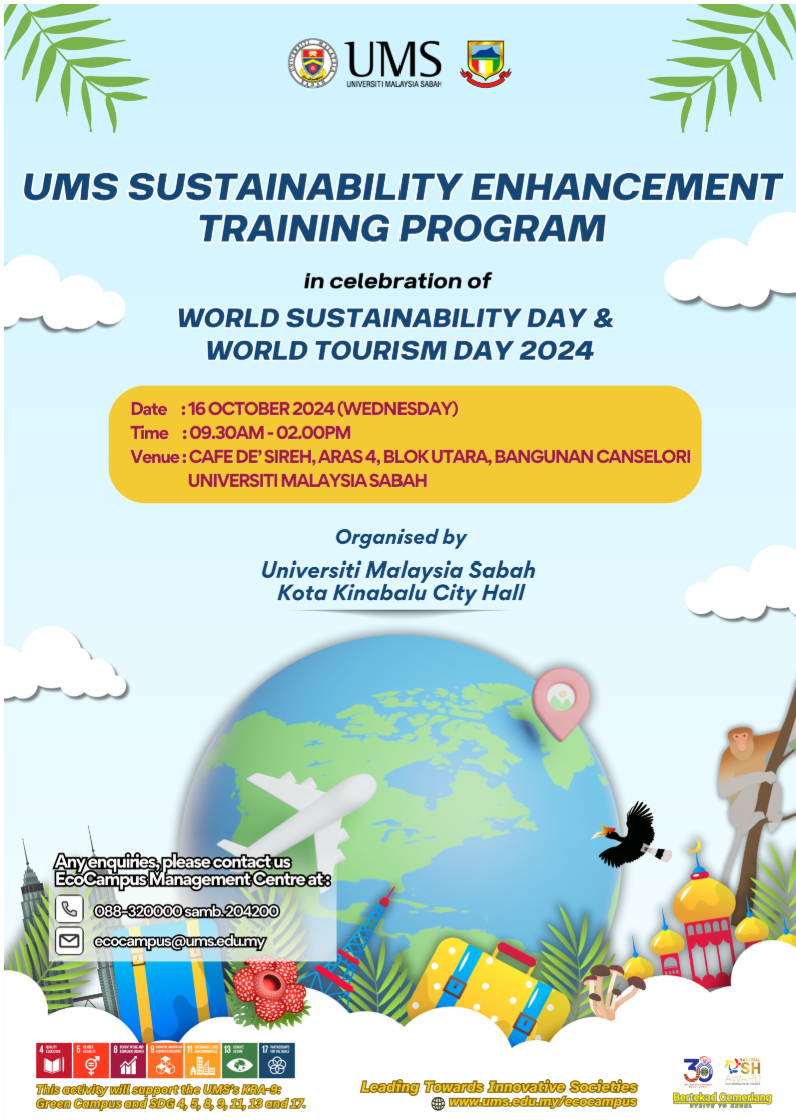
Organised by the EcoCampus Management Centre in collaboration with the Sustainable Energy Development Authority (SEDA), this specialised training series is designed to enhance the skills of UMS staff and faculty members in conducting energy audits across university buildings and operations. Participants will gain hands-on experience in evaluating energy consumption, identifying inefficiencies, and implementing strategies to reduce energy use. By equipping staff with the knowledge to assess and improve energy efficiency, the training supports UMS's commitment to sustainability and green campus initiatives.
Through this program, participants will not only contribute to the university's environmental goals but will also be better prepared to integrate sustainable practices into their teaching, research, and administrative functions. Faculty members, in particular, will be able to incorporate energy auditing techniques into relevant courses, fostering a deeper understanding of energy conservation among students.
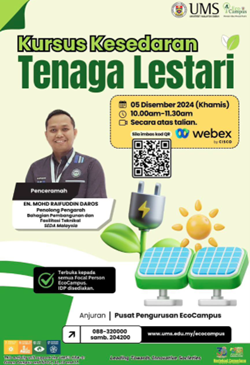
3) COMPOST: Organic Fertiliser Production from Chicken Manure
The KOMPOS: Organic Fertiliser Production from Chicken Manure program is an initiative by Universiti Malaysia Sabah (UMS) launched as part of the National Training Week 2024. This program aims to train participants on how to produce organic fertiliser through the composting of chicken manure, in line with Sustainable Development Goals (SDGs) and sustainable agricultural waste management.
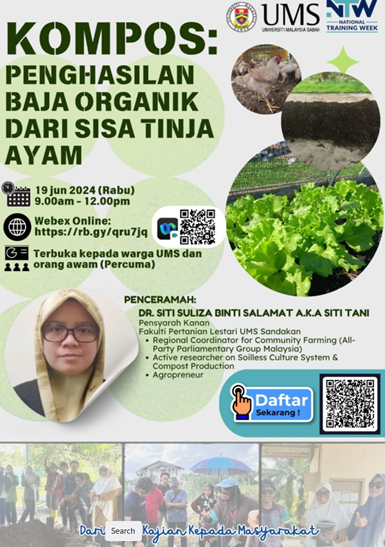
4) 8th Regional Conference on Campus Sustainability 2024
The 8th Regional Conference on Campus Sustainability (8RCCS2024), organised by Universiti Malaysia Sabah in partnership with Adamson University (Philippines) and National Institute of Technology, Fukushima College (Japan), focuses on advancing sustainability practices in higher education institutions. This conference brings together faculty, staff, and students from various universities to discuss and exchange ideas on eco-campus management, sustainable campus development, and strategies for integrating environmental sustainability into university operations.
The conference is open to UMS staff, faculty, and other higher education professionals interested in sustainability initiatives. Participating staff will have the opportunity to gain insights from international experts, learn about best practices in campus sustainability, and contribute to the global conversation on environmental impact in academic settings.
Attendance at the 8RCCS2024 conference can be considered for eLNPT Annual Academic Staff Performance Assessment as part of staff development and training points. Participating staff members can document their involvement in the conference as part of their professional development goals. This aligns with UMS’s commitment to supporting staff in pursuing sustainability education and integrating environmental considerations into their roles within the university.
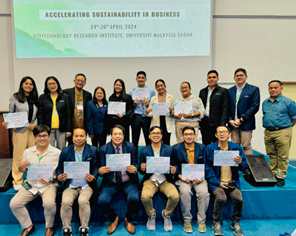
5) First National Symposium on Sustainable Construction
The First National Symposium on Sustainable Construction, scheduled for November 28, 2024, will explore sustainable construction materials and practices, with a particular focus on the use of De-oiled Bleaching Earth (DOBE) in eco-friendly construction solutions. The symposium aims to provide a platform for professionals to discuss how sustainable building materials can reduce the environmental impact of construction projects, thereby contributing to broader environmental conservation efforts.
This event is open to UMS staff, faculty, and professionals in the construction, architecture, and engineering sectors who are interested in sustainable development and green construction technologies. Participating staff will gain valuable insights from industry experts on sustainable construction practices and will have the opportunity to network and exchange ideas on eco-friendly building solutions.
Attendance at the First National Symposium on Sustainable Construction 2024 qualifies for ELNPT Annual Assessment. Staff members can record their participation in this event as part of their annual professional development goals under the ELNPT training points system. This participation aligns with UMS’s commitment to fostering a sustainable campus and supports staff development in areas of environmental impact, construction sustainability, and green building practices. environmental conservation efforts.
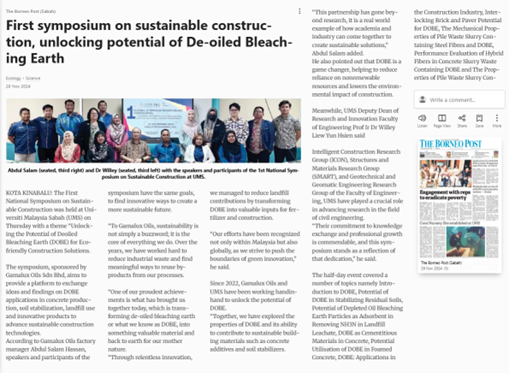
6) Health Awareness Talk Series 3/2024: Promoting Safe and Sustainable Practices
The Health Awareness Talk Series 3/2024, held on 29 October 2024 at Anjung Siswa, Universiti Malaysia Sabah (UMS), was successfully conducted with active participation from UMS staff and students. The event was organised by the Student Residential and Facility Management Centre (PNRF) and featured two insightful sessions:
SN Francesca Francis, who delivered a session on “Clean Hands, Safe Food”
Assoc. Prof. Dr. Khalid Bin Mokti, who shared expert insights on “Food Safety & Quality.”
This program forms part of UMS's ongoing efforts to integrate environmental and public health awareness into its mandatory Individual Development Plan (IDP) training for staff. Emphasizing hygiene practices and food safety directly supports the United Nations Sustainable Development Goals (SDGs), particularly SDG 3 (Good Health and Well-being) and SDG 12 (Responsible Consumption and Production).
By highlighting the importance of hand hygiene and safe food handling, the talk aimed to foster a healthier and more sustainable campus environment. Staff members, especially those involved in food services and campus operations, gained valuable knowledge that contributes to environmental sustainability, public health, and improved quality of life at UMS.
UMS remains committed to equipping its community with the knowledge and skills needed to uphold safety, cleanliness, and sustainability as part of its EcoCampus vision.
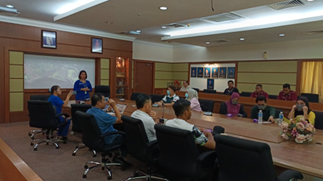
7) UMS-SPRINT: ESG Module Implementation
The Centre for Co-Curriculum and Student Development (PKPP) at UMS developed the UMS-SPRINT: ESG Module, focusing on Environmental, Social, and Governance aspects. While primarily designed for students, this module serves as a valuable resource for staff training, emphasising the importance of environmental stewardship and sustainable governance practices within the university setting.
